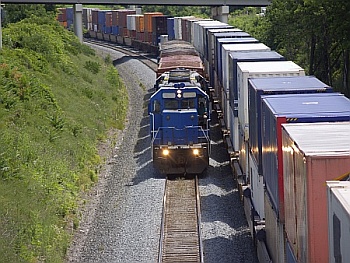ATA criticizes Obama budget
Officials from the American Trucking Associations (ATA) recently criticized President Obama’s proposed 2015 budget because it favors rail and intermodal freight movement over highways and trucking.
“The administration’s proposed budget misses the mark when it comes to the transportation needs of the U.S. economy,” said ATA President Bill Graves. “It provides no real funding solutions for the long-term health of our infrastructure and proposes massive new subsidies for a mode that moves a small proportion of America’s freight and passengers.”
Graves said freight railroads moved 14.7 percent of all domestic freight according to the latest statistics, which pales compared to the 68.5 percent moved by America’s trucking industry.
“While freight railroads and intermodal rail play small, but important roles in goods movement, the lifeblood of our economy is and will continue to be the U.S. trucking industry,” Graves said. “By mid-January, this industry moved as much freight as the railroads will move all year, and this budget proposes to re-direct funds from road and bridge projects that would improve capacity and ease bottlenecks to underwrite projects for an industry that continually crows about how self-sufficient it is.”
ATA also took aim at investments into intercity passenger rail systems.
“It is also difficult to understand this Administration’s insistence on continuing to pour billions of dollars into an intercity passenger rail system that carries just one-tenth of one percent of passenger miles, while failing to provide the necessary resources to improve the safety and efficiency of the highway system, which handles 87 percent of passenger travel,” Graves added.
ATA Chairman Phil Byrd said the Administration should more investment into improving the nation’s roads and bridges.
“Finding a long term, sustainable way to improve our nation’s roads and bridges is one of ATA’s top priorities,” said Byrd, president of Bulldog Hiway Express. “Using the proceeds from corporate tax reform, while creative, does little to address the long-term solvency of the Highway Trust Fund or to uphold the principle of users paying for the services they get, in this case, the federal fuel tax, which has not been adjusted in more than two decades to account for inflation and improvements in vehicle fuel efficiency.
“The fuel tax is, and will continue to be the most efficient and fair way of collecting revenue for highways and bridges and should be adjusted to reflect current economic conditions and needs,” Byrd said.
As part of his fiscal year 2015 budget, President Obama released his plan for a four-year surface transportation reauthorization.
That four-year, $302 billion surface transportation reauthorization measure would supplement existing Highway Trust Fund revenue with $150 billion from revenue generated from “pro-growth corporate tax reform.”
The President’s plan calls for a new Transportation Trust Fund that would include a Highway Account, a Mass Transit Account, a Rail Account, and a Multimodal Account. The accounts for highways and transit would continue to receive user-generated revenue such as the gas tax and would also be supplemented with General Fund transfers that are offset by changes to the corporate tax code. The Rail and Multimodal Accounts would be funded through General Fund transfers.
The reauthorization proposal by Obama would follow MAP-21 programmatic structures for the most part, while also creating several new programs under FHWA, including: a Critical Immediate Investments Program (part of Obama’s “Fix it First” initiative, focusing on improving existing transportation assets and cutting down on structurally deficient bridges), a Freight Program (which aims to cut down on freight bottlenecks and improve efficiency in moving goods), and a Fixing and Accelerating Surface Transportation program (a discretionary program that would reward innovative solutions to transportation challenges).
Obama’s FY 2015 budget calls for $91 billion in funding for the U.S. Department of Transportation. That number is about $18 billion above current funding levels.
“President Obama has offered the kind of aggressive transportation budget our country needs – one that replenishes the Highway Trust Fund today while also helping ensure the country has a safe, efficient transportation system for tomorrow,” said U.S. Transportation Secretary Anthony Foxx. “These funds will do everything from helping communities tackle their transportation to-do lists to improving access to ladders of opportunity. And we will do everything at the Department of Transportation to make this budget a reality, including sending a bill to Congress to support it.”
The plan calls for $48.6 billion for the Federal Highway Administration (a 19 percent increase over FY 2014), $17.6 billion for the Federal Transit Administration (a 63 percent increase), $851 million for National Highway Traffic Safety Administration (up 4 percent), $669 million for the Federal Motor Carrier Safety Administration (a 14 percent increase), about $5 billion for the Federal Railroad Administration (a 210 percent increase), and $15.4 billion for the Federal Aviation Administration (a 2 percent decrease from the current year).






